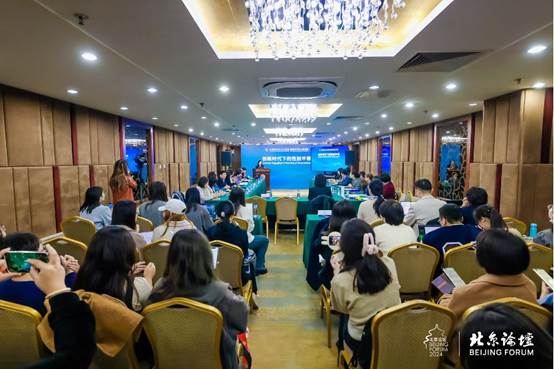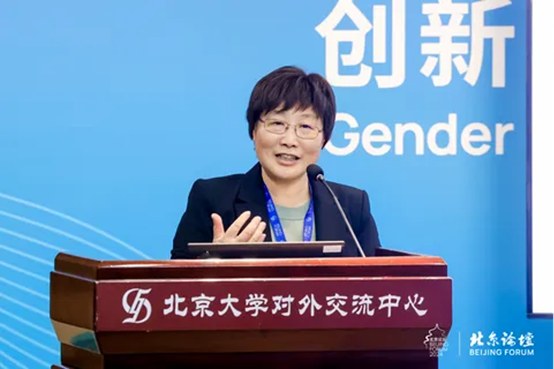Peking University, November 3, 2024:Beijing Forum 2024’s panel session on “Gender Equality in the Era of Innovation” was held from November 2 to 3 at Peking University’s Yingjie Exchange Center. Scholars and policymakers in women’s studies, economics, law and other fields, gathered to examine the importance of gender equality in modern society.

Panel Session on “Gender Equality in the Era of Innovation”
During the opening ceremony, Professor Ye Jingyi from PKU School of Law welcomed guests from China and abroad. She shared PKU’s contribution in women’s studies and gender equality, stressing that gender equality is not just a national issue, but one that concerns the world and mankind.
“Women are the pioneers of human civilization,” said Wu Haiying, vice president of the China Women’s Studies Association. Also the chairman and secretary of the Secretariat of the All-China Women’s Federation, Wu highlighted the growing role of women in various job sectors, and current laws in place to support birth policy and women on maternity leaves.

Wu Haiying
Work, Family and Gender Equality
The panel first explored the theme, “Work, Family and Gender Equality.” Professor Liu Aiyu from PKU’s Department of Sociology drew links between declining birth rates and factors like income gaps, shift in gender attitudes and fertility practices, as well as population mobility and urbanization.
Zhang Lei, Deputy Director at PKU Institute of Population Research, shared her findings from a study on fertility intentions, which revealed that married couples with only one party being the only-child had the largest socio-economic status (SES) gap. Drawing from these findings, Zhang suggested that policymakers could consider the need to maintain female well-being and reproductive potential while pushing for higher birth rates.

Liu Aiyu

Zhang Lei
After a short coffee break, Liu Liqun, president of China Women’s College, Li Yingtao, director of the Center of Gender and Global Issues at Beijing Foreign Studies University, and Zeng Xiangquan, director of China Employment Research Institute at Renmin University, expanded on the topic of family values and gender roles in families. Liu proposed that more needs to be done to support women’s needs like personal development, income, and welfare. Li spoke about the need to identify deep-rooted structural and power imbalance in families and the workplace, in order to create more equal and harmonious gender relations.
Zeng spoke about the labor economy with a focus on unpaid labor industries, where women were found to contribute more in marriage and family. He noted that over the years, both genders had a smaller gap in household chores contribution, but a larger gap in childcare contribution.

Liu Liqun

Li Yingtao

Zeng Xiangquan
Elaborating on the topic of women in the workplace, Sarah Cook, head of the Department of Economics at the University of Nottingham in Ningbo, raised possible areas of policy intervention in family policy, care provisions and labor markets, highlighting the disadvantage women face in family negotiation where houses are often under men’s names in China.
Professor Yang Juhua from the Minzu University of China then analyzed female population statistics based on the Seventh National Population Census. She points out that while there continues to be significant differences in gender structures across different parts of China, and more women are venturing out of the house, fewer men are staying at home. It is thus crucial to understand the needs of women, improve public policy and emphasize the value of having children amongst women.
Wang Yuanyuan from PKU Third Hospital spoke on violence and infertility. She emphasized that women are at a disadvantaged position in gender-based violence, while infertile women are at higher risk of intimate partner violence (IPV).

Sarah Cook

Yang Juhua

Wang Yuanyuan
Social Development and Gender Equality
Huang Qun, senior programme officer at the International Labor Organization kick-started the second day of the panel session with a sharing on international labor standards and policy tools to promote gender equality. Huang shared on two conventions by the International Labor Organization to support women during maternity and those with family responsibilities, as well as care policy packages for children, such as educational and childcare support.
This was followed by a speech from Professor Ma Yinan of PKU Law School. She spoke on the new marriage and family law, which takes into consideration property-related issues during co-habitation. Ma believes that it is important for law policies to include housework compensation especially in the divorce cases. Professor Ye Jingyi from PKU Law School also spoke about gender equality in law, noting the need to balance managing and promoting charitable law to push for social inclusion and gender equality.
Du Jie, Executive Director at the China Women’s Studies Association spoke on ideologies, policies and practices for women’s development in the context of Beijing+30. Moving forward, China can provide more support for women in innovation and green development, as well as promote family development and equality, Du said.

Huang Qun

Ma Yinan

Ye Jingyi

Du Jie
Professor Preeti Shroff-Mehta from Northwestern Medill discussed “Women’s Global Leadership Paths,” noting that women leaders navigate five spheres—family, education, workplace, marriage, and society—compared to men’s more linear, hierarchical path.
Cai Shuangxi of China Women’s Newspaper highlighted rural women’s use of short videos to promote rights, increase family status, and boost village economies, despite challenges like media-reality gaps and financial sustainability.
Lastly, Droma, founder of Xi Zang Zhuopanlin Culture, shared business models supporting Tibetan women in environmental and craft-based industries, empowering them to develop leadership skills while preserving cultural integrity.

Professor Preeti Shroff-Mehta

Cai Shuangxi

Droma
As Karl Marx once said, “great social revolutions are impossible without the feminine ferment.” With women’s great contributions throughout the development of society, more support can be given to support them in areas such as marriage, child-raising, personal development and balance, through policies and societal support.
Reported and written by:Rachel Lee
Edited by:Wu Jiayun
Photos by:Beijing Forum Secretariat



